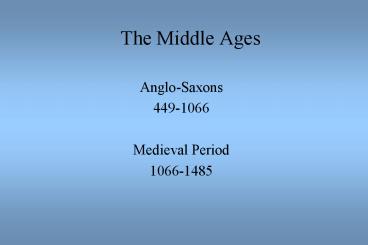The Middle Ages - PowerPoint PPT Presentation
1 / 14
Title:
The Middle Ages
Description:
Romans rule Britain for 400 years. Bring language, architecture, roads ... 'Seafarer' is a good example of an elegiac lyric. Riddles were also common ... – PowerPoint PPT presentation
Number of Views:103
Avg rating:3.0/5.0
Title: The Middle Ages
1
The Middle Ages
- Anglo-Saxons
- 449-1066
- Medieval Period
- 1066-1485
2
Old English
- 55 B.C. Julius Caesar tries to invade Britain
not successful - Claudius successful
- Romans rule Britain for 400 years
- Bring language, architecture, roads
- Romans leave to defend their territory
3
Old English
- Angles, Saxons, Jutes, and Frisians soon moved in
from the Norwegian and German coasts - Denmark, Norway, and Sweden
- Drove the Celts out to Scotland, Wales, and
Ireland and soon dominated the main isle - most powerful of these groups was the Angles.
- second most powerful group was the Saxons, this
period is often referred to as the Anglo-Saxon
period. - language spoken was Old English.
4
Old English
- Jutes and the Frisians, from modern day Denmark,
settled along the west coast of Britain - Anglo-Saxons were the biggest group in the
English parts of Britain - English regions were basically able to rule
themselves. - English regions split into four kingdoms North
Umbria, Mercia, Wessex, and East Anglia
5
Middle English
- 1066 Battle of Hastings
- French conquer Britain
- Rule for 200 years
- English becomes language of lower class
- Ends in 14th Century
6
Modern English
- 16th Century
- Increased trade
- Political and economic success
- Language develops rapidly
7
Influence on Language
- Old English also called Anglo-Saxon
(449-1150CE) the language of Beowulf - Middle English influenced by the French Normans
(1150-1500CE) the language of Geoffrey Chaucer - Modern English marked the rise of the English
state (1500-present) the language of Edmund
Spenser and William Shakespeare
8
ALFRED THE GREAT
- 871-899
- Most remarkable of all English kings
- Patron of scholars and educators
- Promoted the use of written English instead of
Latin - Anglo-Saxon Chronicle
- Founded the first English public schools
9
Anglo-Saxon Civilization
- A Lord's Life
- Richer lords lived on estates
- Inside the hall a lord might mark his prestige
- The hall was the scene of feasts for the lord's
followers - Used warfare to acquire land
10
(No Transcript)
11
Religion- Paganism
- The Anglo-Saxons were pagans when they came to
Britain - They worshipped many different gods.
- Religion for the Anglo-Saxons
- Religious observance consisted of invocations and
charms to ensure the gods' help
12
ANGLO-SAXON LITERATURE
- Heroic Tradition Elegiac Tradition
- Two most important traditions
- Beowulf is the most important single poem
- Seafarer is a good example of an elegiac lyric
- Riddles were also common
- Prose and verse were generally written in Latin
(occasionally in English for verse)
13
Old-Middle-Modern English
- Fæder ure þu þe eart on heofonum - Father our
thou that art in heavens - Si þin nama gehalgod - be thy name hallowed
- to becume þin rice - come thy kingdom
- gewurþe ðin willa - be done thy will
- on eorðan swa swa on heofonum. - on earth as in
heavens - urne gedæghwamlican hlaf syle us todæg - our
daily bread give us today - and forgyf us ure gyltas - and forgive us our
sins
14
Middle English
Oure Fadir that are in hevenes,Halewid be thi
name,Thy kingdom come to thee,Be thi will don
in eerthe as in hevene.Give to us this day oure
breed over othre substance,And forgive to us
oure dettis as we forgiven oure dettours.And
lede us not into temptation, But deliver us from
ivel.































